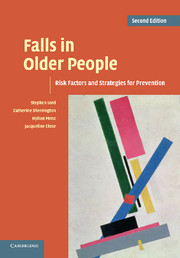Book contents
- Frontmatter
- Contents
- Preface
- Acknowledgements
- Part I Epidemiology and risk factors for falls
- 1 Epidemiology of falls and fall-related injuries
- 2 Postural stability and falls
- 3 Gait characteristics and falls
- 4 Sensory and neuromuscular risk factors for falls
- 5 Psychological factors and falls
- 6 Medical risk factors for falls
- 7 Medications as risk factors for falls
- 8 Environmental risk factors for falls
- 9 The relative importance of falls risk factors: an evidence-based summary
- Part II Strategies for prevention
- Part III Research issues in falls prevention
- Index
- References
5 - Psychological factors and falls
Published online by Cambridge University Press: 03 May 2010
- Frontmatter
- Contents
- Preface
- Acknowledgements
- Part I Epidemiology and risk factors for falls
- 1 Epidemiology of falls and fall-related injuries
- 2 Postural stability and falls
- 3 Gait characteristics and falls
- 4 Sensory and neuromuscular risk factors for falls
- 5 Psychological factors and falls
- 6 Medical risk factors for falls
- 7 Medications as risk factors for falls
- 8 Environmental risk factors for falls
- 9 The relative importance of falls risk factors: an evidence-based summary
- Part II Strategies for prevention
- Part III Research issues in falls prevention
- Index
- References
Summary
In the preceding chapter we described how human balance and falls avoidance depend on the contributions from multiple sensory and motor systems. Considerable research has also found that psychological factors, such as attentional limitations, fear of falling, cognitive impairment and depression, are also associated with impaired stability and falling in older people. This chapter will review and discuss the implications of this work in relation to attentional limitations and fear of falling. As cognitive impairment and depression can also be viewed as medical conditions, discussion of these conditions as risk factors for falls is included in Chapter 6.
Attentional limitations
As outlined in Chapter 2, the maintenance of balance is a complex task requiring the integration of sensory information regarding the position of the body relative to its surroundings and the ability to generate forces to control body movement. This process has traditionally been considered to be automated and controlled primarily by reflex activity. However, there is an emerging body of research indicating that the control of posture also requires attentional resources, and an individual's balance may be influenced by their information processing ability when performing two or more tasks simultaneously. In response to these findings, a number of investigations have been recently performed to evaluate the effect of ‘dual tasking’ on postural control in young people, older people and older people at risk of falls.
- Type
- Chapter
- Information
- Falls in Older PeopleRisk Factors and Strategies for Prevention, pp. 90 - 100Publisher: Cambridge University PressPrint publication year: 2007
References
- 1
- Cited by



